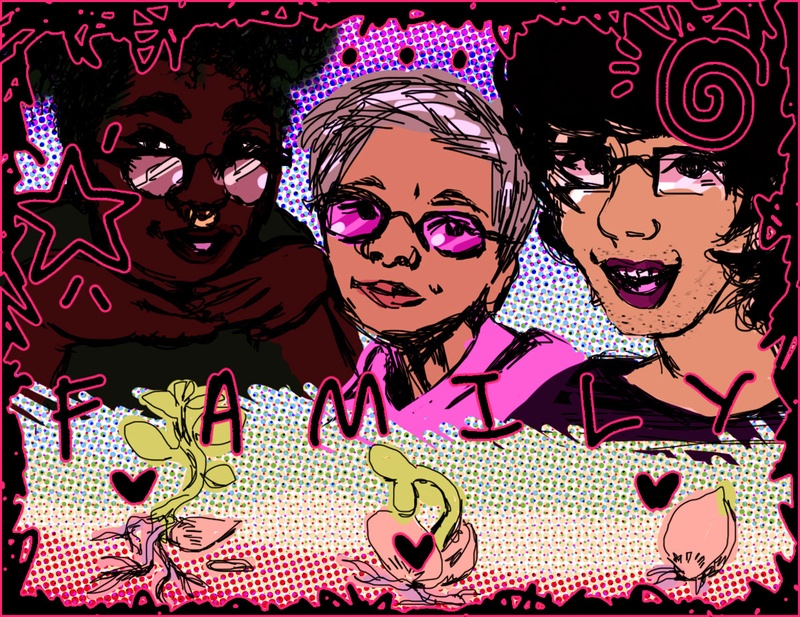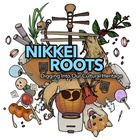(content warning; child abuse and suicidality)
These days, I talk with my grandma, younger siblings, and a cousin, but that’s it for biological family.
I’ve cut ties with my white dad twice. My mom and him are too entwined to part.
Recently I met with her at a donut place and said to her in public, “I can’t trust you, but, I love you.”
This is the moment that I was too tired to keep being condescended to by the way our relationship has been. I feel a desire to grow, and heal, but to be honest I never know if I’m doing it right. I am aware this is unusual, and despite living inside my own experience, my awareness of the extremity of this decision yanks me out of body.
Hopefully I can find a way to have healthy relationships with both of them someday.
When I was little, before my mom and dad separated for a short while, an amazing orange and green kimono with shiny embroidery was displayed on a wall of our suburban home. Near it was a two-shelf plywood bookcase with big wooden geta, as well as two ceramic teapots with bamboo handles, and small box of wigs for dolls. To me, these things were adult things, shoes literally too big for me to wear, even though I’d stand them up on our weird 70s carpeting and climb up to balance on them as if they were large rocks I didn’t want to fall off of. Someday I would be an adult. The kimono was so visually large, it took the whole wall and my eye could not span the entirety of its fabrics; so I would stay lost in the environments described in its textured threads.
Visiting grandma Takae, she would wake us up at six, oatmeal, fruit, and nut breakfasts our way, then have us walk two miles with her only to return and spend our week ends helping her water, weed, harvest; burn piles of redwood and other organic scrap three times taller than us; take the food scraps out to the compost and at night, get naked into her nightly hot tub. Gratitude forever that my life has experienced this.
Awkward memories from childhood, now that I am adultified, are balanced with vocabulary words and with permission from myself to use them. I’ve been told I’m not Japanese, but usually, I’m told something like that when I’m asking a serious question about power dynamics or holding a flashlight in the direction of something ugly. Uncle Ory, who was grandpa’s younger brother and the man Grandma cared for after Grandpa’s death, would insult grandma’s burnt food or when it was too Japanese and not American enough, and call it “cat food”- one example in a large bag of memories much the same, situations involving rooms of adults laughing and my uneasy silence. Now I can safely call that racist and talk candidly with grandma about how much I love her cooking, knowing from talking with her that she has been around a lot of being made to feel the other. After camp, departing from Tule Lake, grandma. Age 13, lived with a white family as their house cleaner and nanny for room and board while going to school; her father, Mitsumasa, could only take care of her younger sister, my auntie Tsuk. Knowing how camp has shaped our family gives a context to the violence, gas lighting, and erasure that shaped my childhood. It also gives context to her successes that allow me to push hard for my dreams.
These days, I live with a friend and their biological family. There are seven of us in a three-bedroom apartment. With our family, it's safe to be critical. It's safe to be silly. It's safe to make burnt food and love it. It’s safe to be a hurt person and express that. It's safe to watch anime and analyze it micro and macroscopically. To be considerate, enryo applies and quiet and space are respected and seen, while simultaneous to that, other family member’s styles of expression are roof shaking scornful jokes in self-defense of the madness hurtled their way earlier; or dense absurdity, hot like a star, combusting with energy. Without my family, I’d be a locked-in groundless gas lit transgender familial child abuse and traumatic brain injury survivor. Without my family I’d still feel like the only way to peace was nonexistence. Can I say right here and now that black lives matter? I’m saying it right now. Black people generate love that often goes unrecognized and taken for granted, and in the case of my family, black, and Mexican, and pinoy, black people saved my life.
I couldn’t be who I am without both of these families. Did I tell you there’s more families?
In our back yard, there is a garden. Somehow eggplant, kabocha, okra, kale, serrano pepper, melon, jade, hibiscus, tomato, squash, raspberry, blueberry, the infamous strawberry, and other mysteries grow little and lush in spite of our strained schedules and tiny backyard apartment dirt/broken glass/rusty nails composite. A redwood tree grows over looking us. I feed them all compost.
The lifeline; a network of volunteers, queer in ways that gender has been strange for them, like for me. When I lived with family again, I could call another trans-gender person and talk about my plans that involved not living anymore. Then after that we could talk about other things, and think about thinking together, and think about living as well as think about dying, then think mostly about living. These days, I redact disclosure of subject matters held in confidence, but I am one of those strangers answering calls, sometimes. Phone family.
Close in my heart are the friendships, family who housed me in my life before the car accident collapsed my already unstable maze-shape. Creative, trustworthy friends who I wish I had hurt less while understanding and coming out of the erasure of my self from childhood. Indigenous people whose art and expressions have changed the social fabric of the area in healthier and more beautiful ways than has been acknowledged by many. Voltron family house.
The first adult friends I made as a legal adult person; the first chance I had to make friends with other Nikkei in our area. Cheerful and supportive friends, who have been the kindest sempai to me in being generous about life, honest expressions loud and soft, and in keeping rhythm; our local taiko group let me play O-daiko in the past, when my brain injury had not yet happened, and practice of eternal loops of vibration encase my head in a space of safety that can never be broken. That eternal loop is so vivid to me, it will always be there. Returning to play taiko is a certain future, but only when I can amplify more love than pain.
To talk about roots, means to talk about a point of origin; however, when I think about when I feel the most Nikkei, I can’t think about anything in particular. All I hear is doko, doko, doko-n.
* * * * *
Our Editorial Committee selected this article as one of her favorite Nikkei Roots: Digging into Our Cultural Heritage stories. Here is the comment.
Comment by Tamiko Nimura
Among many well-written essays in the series, Mori Walts’s essay “Sharing Heart Beats" is a compelling one that charts important and difficult territory in finding our Nikkei roots. With a lyric sensibility and a courageous narrative arc, their essay moves briefly but vividly through portraits of biological and chosen families. Their voice is heartfelt, clear, and strong: it echoes long after the last notes of the odaiko in the concluding sentence of the essay.
© 2018 Mori Walts




